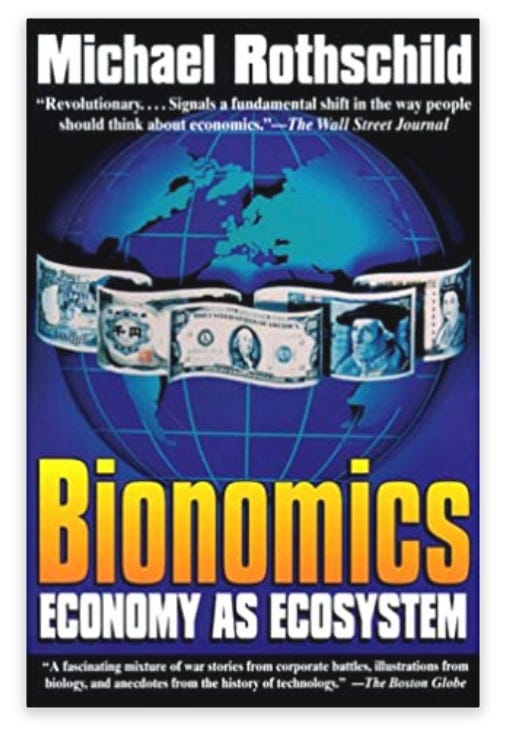Have I mentioned the book, "Bionomics; Economy as Business Ecosystem" by Rothschild, being one of my favorite books? I wish to thank my friend Greg Welch, a senior director at Intel, for the recommendation. I have since read the book he lent me more than a few times and it is falling apart, so I owe him a new copy...Greg, don’t worry, I’m good for it.
Bionomics is the comprehensive study of an organism and its relation to its environment. (Greek: bio = life; nomos = law)
With the advent of crypto currencies we are seeing all of this in a new light. A new lense. When the value of the currency is based solely on the human psyche and having nothing to do with its relativity to any resources or human societal structures, but is solely an investment or gambling vehicle that can be converted into capital to be used in our “tangible” society we have reached a whole new level of economic evolution.
Capitalism, like life, was not planned. It just happened. All factors for its survival were correctly in their place and it began to gestate within the human psyche and early man's society. Through early trade practices and the emergence and growth of more complex human societal structures the evolution of capitalism has grown spontaneously. Just as in the way the human society organizes itself to survive in a world of limited resources, capitalism flourishes when it is not suppressed, as it is also a natural occurring phenomenon.
We have seen this process at work directly through this meltdown of our national and in many respects, global financial systems due to the freedom that our administration allowed for capitalism to flourish. Capitalism is an economic system characterized by private or corporate ownership of capital goods, by investments that are determined by private decision, and by prices, production, and the distribution of goods that are determined mainly by competition in a free market.
This is to say that in a free market economy, without regulations, the distribution of goods and financial expenditures for those goods are determined by the actions of private citizens and corporations working in direct tandem with eachother's financial needs and their own personal or corporate desires for success and survival. In another way to say it would be that capitalism is the evolutionary process of all organisms (businesses, corporations, markets, economies) that seek to adapt and preserve themselves and their own individual environments and their "genetic" success characteristics.
The inheritance of the success "genes" of corporations, as an example, help to maintain the stability of the markets as the corporations continually announce these "genes", and their successful mutations, to the public at large through earnings announcements and stock valuations. This also goes to say, that each local and national economy distribute this same success information to the public at large for them to interrelate within their own environment.
As the economy is continually and dynamically driven into new states by technological change, the rules and lessons of Bionomics are more pertinent than ever. They suggest great caution regarding government planning and control of a naturally growing and self-regulating market economy. Government's role is to protect the property and the rights of individuals and corporations, that allow new economic orders to flourish.
Rothschild notes that the roots of his study of economics theory came from Darwin's natural selection...and it makes intuitive sense that economics would have much more to do with biology than math and statistics. Capitalism is not just another economic system... it is a natural emergent quality of nature itself.
Emergence theory is a concept that has been used in theory since at least Aristotle. It is the study of behavior or emergent property which can appear when a number of simple entities (corporations, businesses, individuals, economies) operate in an environment, forming more complex behaviors as a collective. If emergence happens over disparate size scales, then the reason is there is often a form of top-down feedback in systems with emergent properties. This process may occur in either the observed or observing system, and can commonly be identified by their patterns of accumulating change, most generally called 'growth'. This is more commonly referred to as "Reaganomics" in political discussions today. This behavior occurs because of highly intricate relations across a myriad of scales and feedback to individual results of these behaviors. This inter-connectivity can be predictable or highly unpredictable thus allowing to represent a new level of the system's evolution.
As much as I may be a conspiracy theorist, the complex behaviors or properties are not a property of any single such entity. We are unable to deduce or predict the behavior of the system, that being corporations, national or global economies, from a single or lower level entities, or the citizens or small businesses. Liken this theory to the fact that no physical property of an individual molecule of air would lead one to think that a large collection of them will transmit sound.
This has been studied by watching flocks of birds or a shoal of fish. There is no leader to this systemic movement. The birds or fish move and act and react as one entity, although there is no direct leader. The movements and reactions, or emergent behavior is hard to predict due to the number of interactions between components of a system which increases relating with the number of components, whereby potentially allowing for many new and subtle types of different behavior patterns to emerge. For example, the possible interactions between groups of molecules grows enormously with the number of molecules such that it is impossible for a computer to even count the number of arrangements for a system as small as 20 molecules.
On the other hand, merely having a large number of interactions is not enough by itself to guarantee emergent behavior. Many of the interactions may be negligible or irrelevant, or may cancel each other out. In some cases, a large number of interactions can in fact work against the emergence of new and interesting behaviors by creating a lot of "noise" to drown out any emerging "signal". The emergent behavior may need to be temporarily isolated from other interactions before it reaches enough critical mass to be self-supporting. So, it is not just the sheer number of connections between components which encourages emergence, but it is also how these connections are organized.
A hierarchical organization is one example that can generate emergent behavior (a bureaucracy, or government may behave in a way quite different from that of the individual humans in that bureaucracy, or government entity). Emergent behavior can also arise from more decentralized organizational structures, such as a marketplace.
We have now seen this through the systemic breakdown of the banking industry. In some cases, the system has to reach a combined threshold of diversity, organization, and connectivity before emergent behavior appears. As we have seen the trickle down effects of this connectivity on a global scale. Unintended, or perhaps intended (as I am a conspiracy theorist) consequences and side effects are closely related to emergent properties. That said, although the actual behavior of the intended consequences would not be guaranteed to the individual(s) attempting to manipulate the emergent properties, due to the unpredictability of such a large (global) system, the continued actions and reactions can help justify and allow for the systemic changes to occur on their own. This, over time, allows the individual(s) to change their processes in order to comply with the new evolutions of thought and actions.
Luc Steels is a Belgian scientist, and Director of the Artificial Intelligence Laboratory of the Vrije University Brussel writes: "A component has a particular functionality but this is not recognizable as a subfunction of the global functionality. Instead a component implements a behaviour whose side effect contributes to the global functionality [...] Each behaviour has a side effect and the sum of the side effects gives the desired functionality" (Steels 1990). If I may paraphrase this that, the global or macroscopic functionality of a system with "emergent functionality" is the sum of all "side effects", of all emergent properties and functionalities.
With the most recent global breakdown of our banking systems we realize that the side effects of the banking system directly relate to the effects of the insurance system, which directly relate to the reinsurance systems. These directly relate to the borrowing capabilities of local banking systems and their interdependence on the international banking systems. This directly relates to the borrowing capabilities of the small business and microorganisms, or individual citizens. The success of the macro systems, or host entities, rely more on their own successes to the demise of the individual entities success. Thus, the hailed "trickle down" theory, or "Reaganomics" is not a determined successful business model.
The second law of thermodynamics is an expression of the universal law of increasing entropy, stating that the entropy of an isolated system which is not in equilibrium will tend to increase over time, approaching a maximum value at equilibrium. Systems with emergent properties or emergent structures may appear to defy entropic principles and the second law of thermodynamics, because they form and increase order despite the lack of command and central control. This is possible because open systems can extract information and order out of the environment.
Emergence helps to explain why the fallacy of division is a fallacy. According to an emergent perspective, intelligence emerges from the connections between neurons, and from this perspective it is not necessary to propose a "soul" to account for the fact that brains can be intelligent, even though the individual neurons of which they are made are not. But, this is a discussion for another day!
I will be discussing, in depth, another of my favorite books "Mobs, Messiahs, and Markets" by Bonner and Rajiva soon. I hope you join me for that one! It can be considered part two of this discussion as the emergence theory and economics is explored more thoroughly.











Share this post